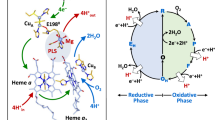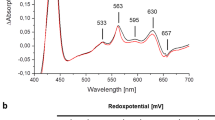Abstract
IT has been shown previously1 that some of the bands of the absorption spectrum, described by Warburg and his co-workers2,3, in Acetobacter (Bacterium pasteurianum) and ascribed by them to the oxidase or oxygen transporting enzyme do not belong to this enzyme but to cytochrome. It was also shown that similar absorption bands are visible not only in organisms with a very active oxidation, such as Acetobacter or Azotobacter, but also in organisms having a much lower respiratory activity, such as brewers' yeast Bacillus proteus, B. coli, and B. dysenteriœ.
This is a preview of subscription content, access via your institution
Access options
Subscribe to this journal
Receive 51 print issues and online access
$199.00 per year
only $3.90 per issue
Buy this article
- Purchase on Springer Link
- Instant access to full article PDF
Prices may be subject to local taxes which are calculated during checkout
Similar content being viewed by others
References
Keilin, D., NATURE, 132, 783, Nov. 18, 1933.
Warburg, O. and Negelein, E., BiocH. Z., 262, 237 ; 1933.
Warburg, O., Negelein, E. and Haas, E. ibid., 266, 1 ; 1933.
Negelein, E. and Gerischer, W., Naturwiss., 21, 884 ; 1933.
Author information
Authors and Affiliations
Rights and permissions
About this article
Cite this article
KEILIN, D. Cytochrome and the Supposed Direct Spectfoscopic Observation of Oxidase. Nature 133, 290–291 (1934). https://doi.org/10.1038/133290c0
Issue Date:
DOI: https://doi.org/10.1038/133290c0
This article is cited by
-
Structure of a unique twofold symmetric haem-binding site
Nature Structural & Molecular Biology (1994)
-
Effect of ligands on cytochromed fromAzotobacter vinelandii
Journal of Bioenergetics and Biomembranes (1980)
-
Cytochrome a and Cytochrome Oxidase
Nature (1938)
Comments
By submitting a comment you agree to abide by our Terms and Community Guidelines. If you find something abusive or that does not comply with our terms or guidelines please flag it as inappropriate.



